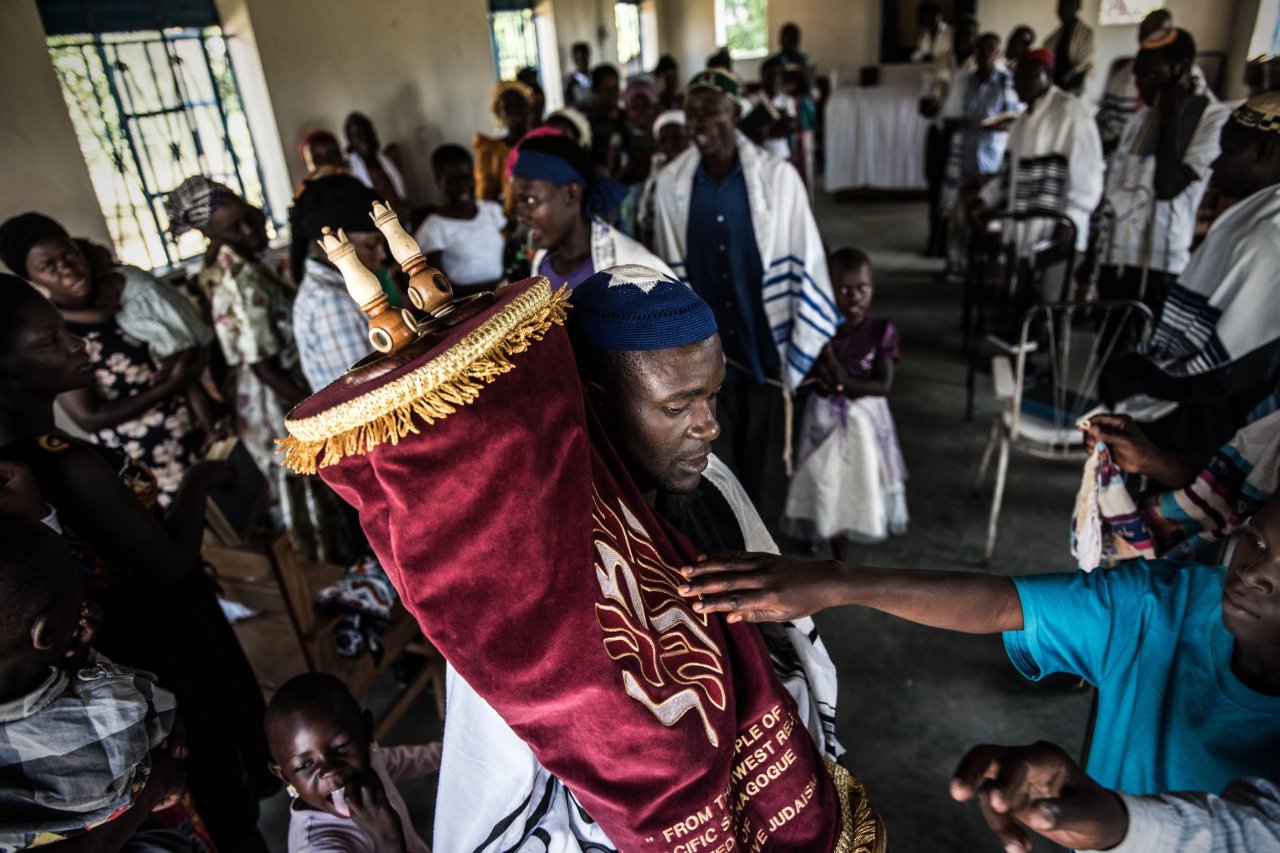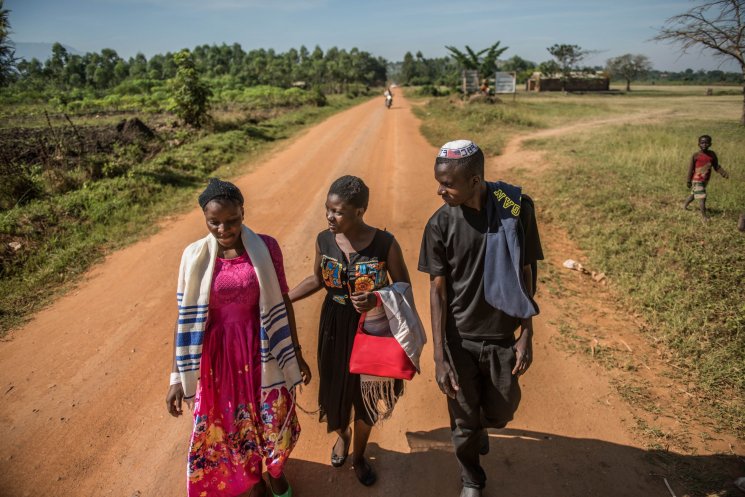
As Uganda's President Yoweri Museveni celebrated yet another election success in late February—he has been in power for 30 years—Rabbi Gershom Sizomu and his followers in the remote eastern village of Nabugoye were celebrating their own electoral victory. The head of a tiny rural community of Ugandan Jews, known as the Abayudaya, Sizomu had made history on February 19, becoming the first Jewish candidate to win a seat in the country's Parliament.
"I had a flash of happiness through my body," says Sizomu, who won 29 percent of the votes in his constituency of Bungokho North, a rural area near the Kenyan border, and edged out seven other candidates. "We don't ask for a lot. Political influence is good for our survival. I can use this position to advocate for my people." Sizomu was sworn into the Ugandan Parliament in mid-May, the only Jew among some 380 lawmakers.
The Abayudaya, which means "people of Judah" in the local Luganda language, live in a handful of eastern Ugandan villages, and they could do with some political leverage. There are fewer than 2,000 members; they make up less than 0.006 percent of Uganda's predominantly Christian population and only 3 percent of Bungokho North's Muslim-dominated population.
Sizomu's brother, Kintu Moses Aron, president of the Abayudaya Men's Club, tells Newsweek that Sizomu's new position will help the community obtain the same legal rights as Christians and Muslims, including getting the government to recognize Jewish holidays so the Abayudaya can observe their traditions. Community members also hope that Sizomu's election will help them obtain funding for Jewish educational services and places of worship. "I think the rabbi being in Parliament will extend our voices to the national leadership," says Eliyahu Muyamba, the chairman of the Abayudaya and the spiritual leader of the village of Namanyoni.
Sizomu, who was born in Nabugoye into a family of Abayudaya leaders (both his father and grandfather had been influential members of the Jewish community), became the country's first rabbi after studying at rabbinical school in Los Angeles. Following his training, he returned to Nabugoye, a small village of mud huts and shady footpaths outside the town of Mbale, which is the community's spiritual center. The town sits on a steep hill where, on a recent evening, workers busied themselves with the construction of a new synagogue, which will look out at the craggy mass of Mount Elgon across the valley on the Kenyan border.
"This will be the mikvah," explains Abraham Mukiivi, an Abayudaya construction worker, pointing to the pool where new members of the community will be converted to Conservative Judaism. (The Abayudaya split in 2003 when Sizomu's cousin Enosh Keki Maniah and a handful of followers learned that Israel's Chief Rabbinate does not recognize Conservative conversions; they instead opted to practice Orthodox Judaism, leaving for the nearby village of Putti.)
Below the synagogue, on a hillside dotted with banana groves and papaya trees, children from the country's only Jewish primary school play football after class. Farther down the road, about 30 men, women and children sing songs and play guitar in a candlelit room for the weekly Friday evening prayer session. Unlike other isolated Jewish communities, who claim direct descent from David, the Abayudaya claim no ancestral connection to Judaism. "We are Jews by choice," says Muyamba. "And we are proud."
The Abayudaya were not the first to consider setting up a Jewish community in this region. In 1903, the British government established the Uganda Proposal, offering to give up a patch of land along the Mau Escarpment in what is now Kenya as a homeland for Jewish communities facing persecution in Europe, but the plan was soon scrapped.
The Abayudaya movement was, by contrast, an entirely local (and unrelated) affair, founded in 1919 by an influential warrior from the Baganda tribe, named Semei Kakungulu. There are many versions of his story, but the basic facts are as follows: In the late 1800s, British missionaries helped Kakungulu convert to Christianity; he became close to the British colonial administration, helping to bring considerable territory under its control. Expecting to be crowned king of these newly conquered lands, Kakungulu was disappointed when given only a small parcel of mountainous land in the east of the country.
The relationship soured further in 1913 when he converted to Malachite Christianity, heavily frowned upon by the British at the time. Six years later, inspired by the biblical books of Moses—which form the basis of the Torah—and angry at the British colonial administration, Kakungulu is said to have circumcised himself and his sons after reading about the ritual in the story of Moses; he then founded the Abayudaya movement. Over the years, a series of Jewish travelers offered materials, guidance and support to the Abayudaya. Now, nearly a century later, the community is thriving.
For the most part, the Abayudaya follow the same practices as the rest of the Conservative Jewish world: They celebrate the festivals, follow the rules of eating kosher food and pray regularly. But their services have a distinctly African style, with Hebrew psalms and prayers mixed in with lilting songs in local tribal languages. In 2003, the community even released an album, Abayudaya: Music From the Jewish People of Uganda. (It's available for sale online.)
Life has often been tough for the Abayudaya, but their greatest struggle was during the despotic and violent reign of Ugandan dictator Idi Amin, in the 1970s. Amin, who reportedly once said that "Hitler was right to burn 6 million Jews," banned Judaism in Uganda, destroyed synagogues and forced the Abayudaya to convert or flee. Just a handful continued to practice in secret, some resorting to holding services in a cave.
"It was scary to be Jewish during Amin's time. I remember we had to do our religious rituals in the bedroom," says Sizomu, sitting in the spacious living room of his home on the lush slopes of Nabugoye hill. By the time Amin fled to Saudi Arabia in 1979, he says, the number of Abayudaya had dwindled to about 300, down from about 2,000 just eight years earlier when Amin came to office.
After Sizomu's election, spirits in Nabugoye are high. "Even in Uganda people don't know we exist," Sizomu told Newsweek. "But when I stand up in Parliament, the whole country will know about the Abayudaya." He previously said that as a member of Parliament, he would try to tackle corruption, boost health services and improve roads in the roughly 400 villages that make up the Bungokho North district.
In April, the Jewish Agency for Israel, a quasi-governmental organization that helps bring immigrants to Israel, gave the Abayudaya another boost by deciding to formally recognize it as a Jewish community, opening up the possibility that it will be able to migrate to Israel under that country's Law of Return and more easily obtain visas to study in Israel.
"After the election and now this [recognition], it's really wonderful," says Rabin Asiimwe, a Ugandan Jew whose family joined the Abayudaya after his uncle encountered some Israeli soldiers visiting Uganda on a training mission. "Everybody is so happy. We feel like we're starting a journey."
Uncommon Knowledge
Newsweek is committed to challenging conventional wisdom and finding connections in the search for common ground.
Newsweek is committed to challenging conventional wisdom and finding connections in the search for common ground.
About the writer
To read how Newsweek uses AI as a newsroom tool, Click here.









